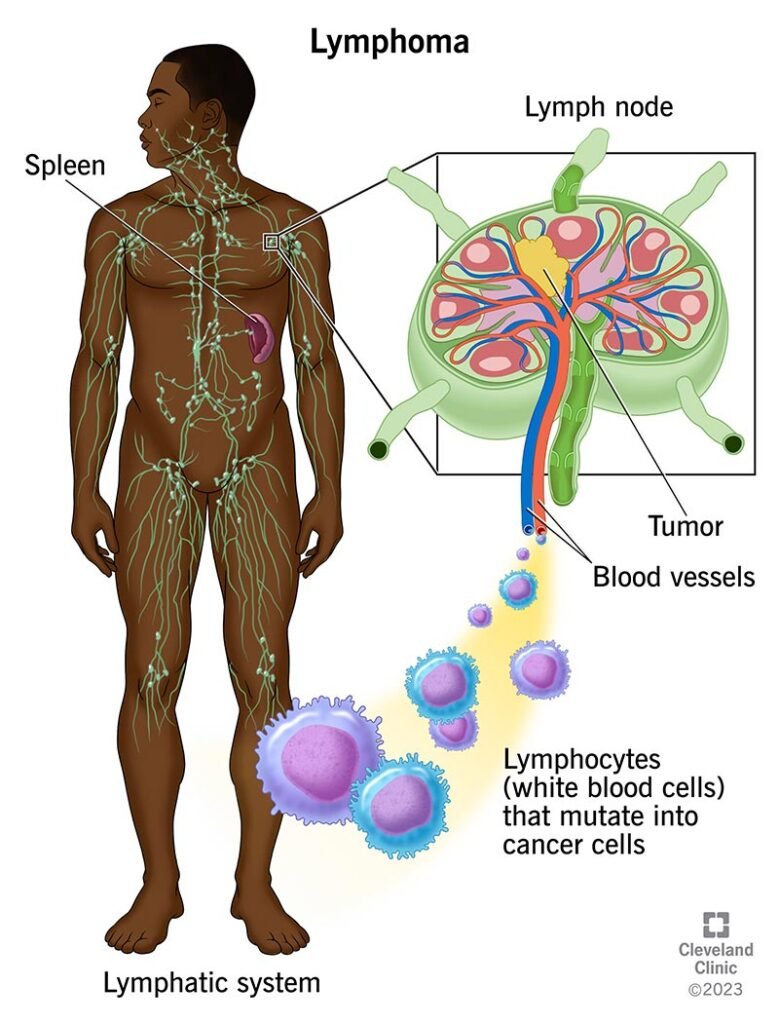Lymphoma is a type of cancer that originates in the lymphatic system, which is part of the body’s immune system. It affects lymphocytes, a type of white blood cell that helps the body fight infections. Lymphomas are generally classified into two main types:

1. Hodgkin Lymphoma (HL)
- Characteristics: Characterized by the presence of Reed-Sternberg cells, which are large, abnormal cells found in lymph nodes.
- Symptoms: Common symptoms include painless swelling of lymph nodes (typically in the neck, armpits, or groin), fever, night sweats, weight loss, and itching.
- Treatment: The treatment approach depends on the stage and specific characteristics of the lymphoma.
2. Non-Hodgkin Lymphoma (NHL)
- Characteristics: Includes a diverse group of blood cancers that affect lymphocytes. It is more common than Hodgkin lymphoma and can be further categorized into many subtypes, such as:
- Diffuse Large B-Cell Lymphoma (DLBCL): The most common type of NHL, characterized by large, rapidly growing B cells.
- Follicular Lymphoma: Typically a slower-growing lymphoma that affects B cells and is often present in the lymph nodes.
- Mantle Cell Lymphoma: A rarer, aggressive type that affects B cells and often presents with more advanced disease.
- Chronic Lymphocytic Leukemia (CLL): A type of NHL that affects B cells and is characterized by the accumulation of small, mature lymphocytes in the blood, bone marrow, and lymph nodes.
- Symptoms: Similar to Hodgkin lymphoma, including swollen lymph nodes, fever, night sweats, weight loss, and fatigue. Symptoms can vary widely depending on the subtype and stage of the lymphoma.
- Treatment: Treatment plans are tailored based on the type and stage of NHL.
Diagnosis
- Physical Examination: Assessment of symptoms and palpation of lymph nodes.
- Imaging Studies: Includes CT scans, PET scans, or MRI to identify the extent of the disease.
- Biopsy: A procedure to remove a sample of lymph node tissue for examination under a microscope to confirm the diagnosis.
- Blood Tests: To check for abnormalities and assess overall health.
Homoeopathy Treatment
Homeopathy is used by some people as a complementary approach to support overall health and manage symptoms associated with lymphoma. Homeopathic remedies aim to stimulate the body’s natural healing processes and improve well-being.
Here are some homeopathic remedies that might be considered for managing symptoms or supporting health in the context of lymphoma:
- Arsenicum Album: For individuals experiencing anxiety, weakness, and symptoms of discomfort, particularly if there is a tendency toward exhaustion or restlessness.
- Calcarea Carbonica: For general weakness, fatigue, and symptoms associated with lymph node enlargement, particularly if there is a history of sluggish metabolism or hormonal imbalances.
- Phytolacca: For conditions with swollen or painful lymph nodes, particularly if there is associated soreness and a tendency for the lymph nodes to feel heavy.
- Hepar Sulphuris: For symptoms related to inflamed or infected lymph nodes, with a tendency toward abscess formation or sensitivity to touch.
- Lachesis: For conditions with symptoms of constriction or pressure, particularly if there is a tendency for symptoms to worsen with heat or if there is a sensation of tightness in the lymph nodes.
- Kali Carbonicum: For individuals with symptoms of heaviness or pressure in the lymph nodes, particularly if there is a tendency for the symptoms to worsen in damp or cold weather.
- Sulphur: For itchy, burning sensations, and discomfort associated with lymph node involvement, especially if there are chronic skin conditions or inflammation.

